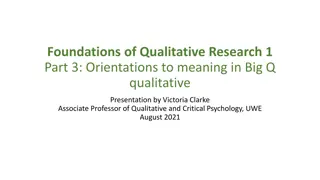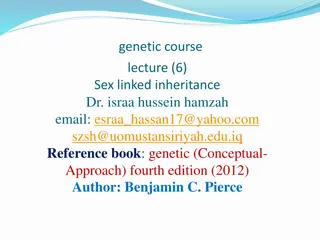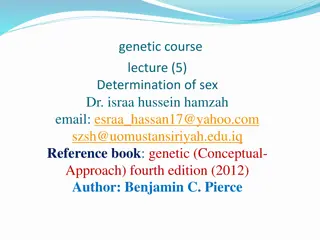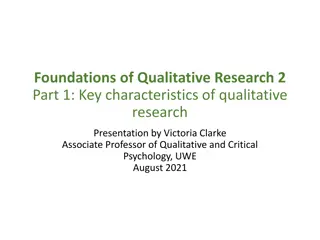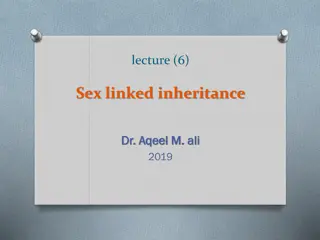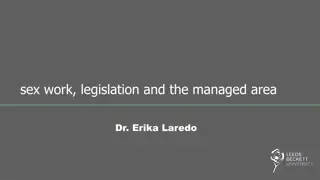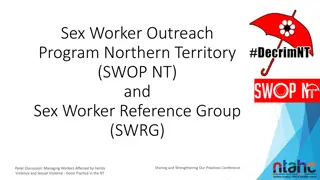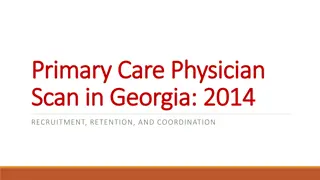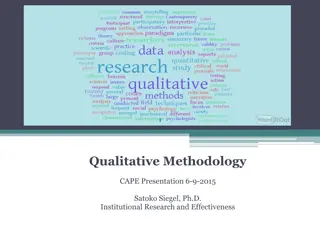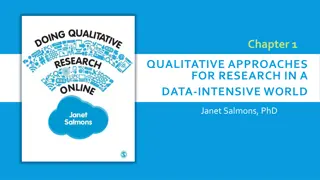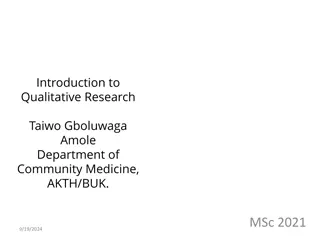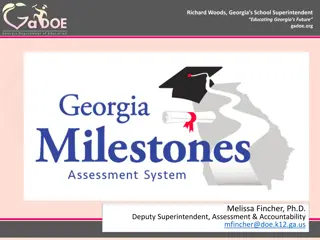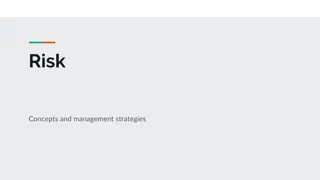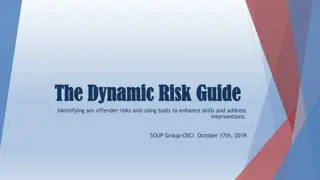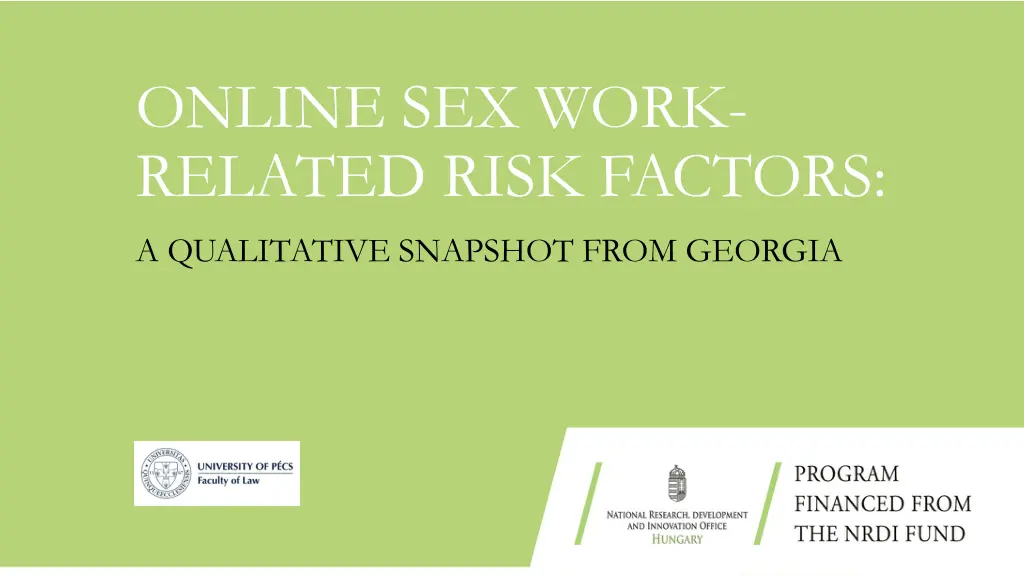
Understanding Online Sex Work Risks in Georgia
Discover the evolving landscape of online sex work in Georgia, exploring the shift to digital platforms, risks of exploitation and trafficking, impact of legal regulations, socio-economic challenges, and the role of the internet in shaping the industry. Learn about the unique factors influencing sex work in Georgia and the safety measures employed by online workers in response to technological risks.
Download Presentation

Please find below an Image/Link to download the presentation.
The content on the website is provided AS IS for your information and personal use only. It may not be sold, licensed, or shared on other websites without obtaining consent from the author. If you encounter any issues during the download, it is possible that the publisher has removed the file from their server.
You are allowed to download the files provided on this website for personal or commercial use, subject to the condition that they are used lawfully. All files are the property of their respective owners.
The content on the website is provided AS IS for your information and personal use only. It may not be sold, licensed, or shared on other websites without obtaining consent from the author.
E N D
Presentation Transcript
ONLINE SEX WORK- RELATED RISK FACTORS: A QUALITATIVE SNAPSHOT FROM GEORGIA
Rationale Evolution of online sex work: oThe shift to online platforms has given sex workers more control over their work, offering more freedom and earning opportunities (Cunningham et al., 2017). oIt also introduces new risks, such as cyberstalking and exploitation (Sanders et al., 2018). Risks of exploitation and human trafficking: oOnline platforms are increasingly used for trafficking, making it difficult to distinguish between voluntary sex work and exploitation (Van Rij, 2014; GRETA, 2022).
Rationale Impact of legal regulations: oLaws like FOSTA/SESTA in the U.S. have led to the shutdown of websites, pushing sex workers into more dangerous environments (Lugo-Graulich et al., 2020). oNew Zealand s decriminalisation approach improved safety and trafficking response (Harrington, 2012). Technological risks and safety challenges: oOnline sex workers face significant safety issues, such as digital harassment, blackmail, and doxing (Sanders et al., 2018). oThe use of encrypted apps and pseudonym payments are common safety measures (Sanders et al., 2018).
Legislative context Prostitution is illegal, not criminalised Facilitation and advertising of prostitution is criminalised Law On the Protection of Family Values and Minors came into force on 2 December 2024 oRestricts freedom of expression and assembly for LGBTQ people oBans gender reassignment surgeries, same-sex marriage, and adoption by LGBTQ people oIntroduces media and education censorship
Socio-economic and migration context Georgia s geographic position between Europe and Asia and its regional instability contribute to migratory flows and economic uncertainty. Economic hardship and limited employment opportunities make online sex work one of the few available income options for marginalised individuals. Low institutional trust and perceived hostility from law enforcement create further vulnerability and isolation. Trans and LGBTQ sex workers experience compounded discrimination, exclusion from services, and targeted violence.
Internet proliferation and online sex work of Georgia s adult population uses internet daily (Caucasus Barometer 2024). Digital platforms have revolutionised sex work in Georgia as well, offering more autonomy, anonymity, and flexible income generation. Closing of local platforms (e.g., kama.ge) pushed sex work into riskier, unregulated digital spaces.
Methodology Qualitative approach: semi-structured interviews. Sampling: purposive and snowball sampling. Respondents identified via Georgian online platforms and NGO contacts. Interviewed 11 sex workers (6 trans women, 5 cis women), included both Georgian nationals and migrants (Kazakhstan, Albania) Interview process: conducted in-person or online via Google Meet; most interviews were recorded with consent. Data analysis: thematic analysis of transcripts focused on identifying working conditions, exploitation risks, and trafficking indicators. Ethics: full anonymity, informed consent, and compensation ensured.
Results Economic and social motivations Most sex workers started before age 20. Experience ranged from 1.5 to 20 years. Main reason for entering sex work was financial hardship. Other factors included lack of family support, discrimination (especially against trans individuals), and limited job options. Some entered sex work to explore identity, intimacy, or out of curiosity. Friends often played a key role in helping them get started or sharing information. Financial hardship, low social capital and access to certain information on sex work are predominant factors, that might also increase risks for those considering working abroad.
Results Digital work context Most respondents work online, using multiple platforms and messaging apps (WhatsApp, Telegram, Signal). Services range from basic sex to BDSM with trans women often offering more diverse services than cis women. Some advertise services they don t actually provide to attract clients. Work methods have shifted over time; older workers have moved from street to online work, though one still prefers offline.
Results Digital work context Economic hardship, inflation, and rising costs (since COVID-19) have reduced demand and impacted pricing. Legislative changes and anti-LGBTQ sentiment have increased safety concerns, especially for trans women. Some tried leaving sex work, but returned due to low pay and discrimination in other jobs highlighting a "sex work trap" (Osellin, 2014).
Results Managing work and safety Autonomy, control over logistics and finances All respondents use aliases, with some having multiple; Georgian sex workers often maintain separate phone numbers for personal and work use, indicating intentional boundaries between identities. Most respondents take cash or receive money through transfer; Most aren't worried about being identified through bank accounts.
Results Managing work and safety Autonomy, control over logistics and finances Georgian sex workers largely exhibit control over work conditions (rules, clients, schedules), indicating a degree of agency and reduced likelihood of trafficking. Foreign sex workers show clear signs of exploitation in at least one case (e.g., no control over schedule, earnings, or housing), and uncertainty in another, suggesting possible coercion or concealed third-party control.
Results Managing work and safety Work setting and safety Hotels are deemed safest due to surveillance and registration. Own homes split opinions: some feel more in control, others feel too relaxed to respond well to threats. Client homes and cars are consistently perceived as dangerous. Environment familiarity, ability to fight back, and external help availability are recurring factors in feeling safe.
Results Managing work and safety Client filtering and enforcement Most sex workers enforce client-based rules (no intoxicated clients, no specific services, hygiene standards). Most respondents are confident in their ability to identify dangerous clients. Some report retaliatory behavior against clients who break rules (e.g., demanding payment and blocking them), which, could introduces new risks of doxxing or legal exposure.
Results Managing work and safety Client filtering and enforcement Trans women often use physical self-defence or fight back, while cis women prefer de-escalation or fleeing. Online workers reported fewer instances of violence than street-based ones. Despite coping strategies, violence remains prevalent, especially in less controlled environments (e.g., street, client s home).
Results Physical and emotional abuse Physical abuse Most respondents (cis and trans women) reported experiencing intimidation, physical violence, or robbery. Street-based sex workers face higher risk of physical assault compared to those working exclusively online. Trans women are more likely to physically fight back and cis women more often reported talking their way out or fleeing dangerous situations.
Results Physical and emotional abuse Emotional Abuse Few respondents mentioned a client building emotional intimacy to gain trust, then exploit them financially or emotionally. Several respondents have received threats to expose sex worker identity to family or public. Some respondents have received death threats and threats to children reported; often no legal action taken due to fear or police inaction. Foreign sex workers showed signs of coercion and fear, with one displaying physical injuries and no control over her work or finances.
Results Lack of trust in institutions Low trust in police Trans women noted a decline in respectful treatment from police following recent legal changes. 112 operators and patrol police are often slow to act, homophobic, or dismissive. Multiple respondents shared cases of public shaming, insults, and failure to trace abusers. Multiple respondents were asked by the police to spy on clients or plant drugs in exchange for protection or money.
Results Lack of trust in institutions Low trust in religious institutions and NGOs Police and clergy previously used sex worker services to gather information on one another s circles. Both the police and the church have their own sex workers now and collect information about members of the other group or information on clients in general. In general, most respondents assessed the NGOs work positively, but they are hesitant addressing NGOs and few express distrust towards the leadership of prominent NGOs.
Results Limited social connections The sex worker community is fragmented, with low trust between members. Trans and cis women often distance themselves from each other s experiences. Few respondents reported turning to friends or other sex workers for help during dangerous situations, and many didn t have anyone they could call for support. Not all sex workers have access to client-sharing platforms or group chats, and even those who do question the reliability of shared information. Some sex workers reported being closer to clients than to their own friends.
Results Perception of risks of human trafficking Most sex workers had only a vague or incorrect understanding of what constitutes trafficking, often confusing it with other forms of exploitation or abuse. Many respondents believed Georgian nationals are unlikely to be trafficked, while foreign sex workers especially those isolated or without local support are viewed as more vulnerable. One foreign sex worker had no control over her schedule, phone, or income strong indicators of trafficking.
Results Perception of risks of human trafficking Several respondents described situations either personal or witnessed that likely involved trafficking, but these were not identified or reported as such. Several respondents shared conflicting information about the possibility of making money abroad (specific countries) and working conditions there some characterising it as good and others as dangerous.
Conclusions Economic hardship and social marginalisation push individuals into sex work, increasing vulnerability to exploitation and trafficking. Trans sex workers face amplified risks due to stigma and migrant sex workers due to isolation, and dependency on third parties. Digital platforms provide autonomy but expose workers to data theft, surveillance, blackmail, and lack of legal protection. Physical and emotional abuse by clients or intermediaries is widespread among the sex workers with few avenues for redress or justice.
Conclusions Deep mistrust of institutions, especially police, deters sex workers from reporting violence or seeking help. Weak social support networks (bonding, bridging and linking social capital) and limited NGO engagement leave many sex workers isolated and unsupported. Low awareness of trafficking risks, especially among Georgian nationals, masks vulnerability to coercion and abuse.
Limitations Limited generalizability small sample gathered through purposive and snowball sampling methods; possibly not reaching the most vulnerable groups; Changing legislative context in Georgia with possible socio-political consequences for the group in focus; Based on the above, more research should follow with focus on tracing 1. risk factors and trends in a wider group and 2. changing legislative socio- political context.
References Caucasus Barometer, 2024. Retrieved from https://caucasusbarometer.org/en/cb2024ge/FRQINTR/ on 3 May 2025 Cunningham, S., Sanders, T., Scoular, J., Campbell, R., et al. (2017). Behind the Screen: Commercial Sex, Digital Spaces, and Working Online. [DOI: 10.1016/j.techsoc.2017.11.004]. and technology-facilitated trafficking in human beings. Council of Europe. Available at: https://rm.coe.int/greta-2022-10-online- trafficking/1680a5fbe7 [Accessed 26 Mar. 2025]. Harrington, C. (2012). Prostitution policy models and feminist knowledge politics in New Zealand and Sweden . Sexuality Research and Social Policy, 9, 337-349. Lugo-Graulich, K., Myrent, M., Pierotte, L.M., & Brick, B.T. (2020) Prosecuting Trafficking in Persons Cases: An Analysis of Local Strategies and Approaches, Final Report. NCJ 301296. Available at: [https://www.ojp.gov/library/publications/prosecuting- trafficking-persons-cases-analysis-local-strategies-and-approaches] [18.02.2025] Sanders, T., Scoular, J., Campbell, R., Pitcher, J., Cunningham, S., Sanders, T., ... & Cunningham, S. (2018). `Crimes and safety in the online sex industry . Internet Sex Work: Beyond the Gaze, 87-119. Van Rij. J.J.M. (2014). The trafficking and sexual exploitation of native Hungarian speaking women in the Netherlands. A Case study into the nature of forced prostitution and the modus operandi of organized crime groups involved in human trafficking in Europe , PTE-AJK
The study was carried out by The Trafficking Research Centre at Sulkhan-Saba Orbeliani University, supported by the National Police of Kingdom of Netherlands (Politie) Ushangi Bakhtadze, Sulkhan-Saba Orbeliani University, e-mail: u.bakhtadze@sabauni.edu.ge Tsisana Khundadze, Sulkhan-Saba Orbeliani University, e-mail: tsisana.Khundadze@sabauni.edu.ge Jorn VAN RIJ, University of P cs, e-mail: jorn.van.rij@politie.nl

